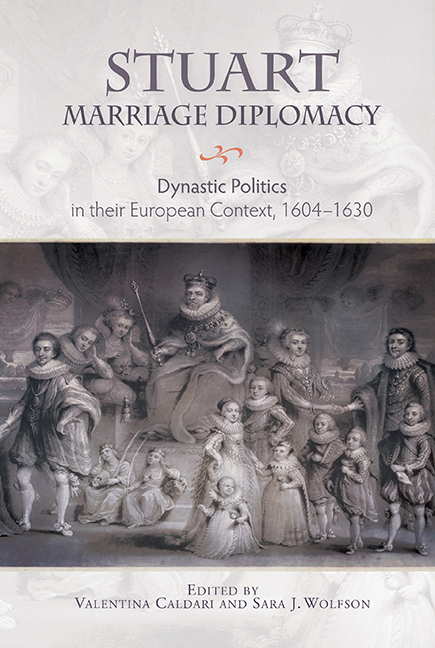Book contents
- Frontmatter
- Contents
- List of Illustrations
- List of Contributors
- Acknowledgements
- List of Abbreviations
- Introduction
- Part One Marriage and the Court
- Part Two Marriage and Politics
- Part Three Marriage and War
- 9 The Stuarts, the Palatinate and the Thirty Years’ War
- 10 Marital Problems? Stuart Alliances, Scottish Politics and the Protestant North, 1603–41
- 11 Recognizing Friends from Foes: Stuart Politics, English Military Networks and Alliances with Denmark and the Palatinate
- Part Four Marriage and News
- Part Five Marriage and Continental Europe
- Part Six Marriage and Ceremony
- Bibliography
- Index
- Studies in Early Modern Cultural, Political and Social History
11 - Recognizing Friends from Foes: Stuart Politics, English Military Networks and Alliances with Denmark and the Palatinate
from Part Three - Marriage and War
Published online by Cambridge University Press: 24 October 2019
- Frontmatter
- Contents
- List of Illustrations
- List of Contributors
- Acknowledgements
- List of Abbreviations
- Introduction
- Part One Marriage and the Court
- Part Two Marriage and Politics
- Part Three Marriage and War
- 9 The Stuarts, the Palatinate and the Thirty Years’ War
- 10 Marital Problems? Stuart Alliances, Scottish Politics and the Protestant North, 1603–41
- 11 Recognizing Friends from Foes: Stuart Politics, English Military Networks and Alliances with Denmark and the Palatinate
- Part Four Marriage and News
- Part Five Marriage and Continental Europe
- Part Six Marriage and Ceremony
- Bibliography
- Index
- Studies in Early Modern Cultural, Political and Social History
Summary
Stuart foreign affairs in the seventeenth century were complex, often seemingly contradictory and rarely straightforward. On the eve of the Thirty Years’ War Europe was composed of a diverse range of powers, and the largest of these – namely France, Spain and the Holy Roman Empire – have attracted the bulk of scholarship. Unfortunately by doing so a variety of other city states, duchies, republics and kingdoms have been overlooked. There has often been a historiographic assumption that early modern Europe functioned in the same way as the ‘great power’ politics of the nineteenth century, which was simply not the case. Indeed it is worth noting that although in modern Europe Denmark is a small polity, in early modern Europe the control of the Danish sound allowed the king of Denmark-Norway to exert significant influence over both Scandinavian and German affairs. The Holy Roman Empire itself was not an absolutist centralized state ruled by the emperor, but a myriad of German states bound within the highly complex imperial constitution. In recognizing the differences between seventeenth- and nineteenth-century Europe, and by examining the role of these other early modern European powers, a more accurate, if more complex, picture emerges.
This chapter stems from two relatively recent historiographical lines of enquiry, both of which owe a debt to this shift. The first is the development of a wider view of Europe reaching beyond the Mediterranean world and western Europe. This broader approach spans from the Baltic to the Mediterranean and from Muscovy to the coast of Ireland, and through the assessment of the role of many of the perceived lesser powers a host of challenges to some long-held historiographical concepts have been developed. Spain and France can be seen as two powers within a wider framework of alliances. A number of the Stuarts’ closest allies have fallen victim to this oversight. This includes the Palatinate marriage that has often been simply ignored as an unimportant choice in contrast to the Stuarts’ pursuit of a match with France or Spain. The interaction between Scotland and Scandinavia has arguably received even less attention.
- Type
- Chapter
- Information
- Stuart Marriage DiplomacyDynastic Politics in their European Context, 1604–1630, pp. 173 - 186Publisher: Boydell & BrewerPrint publication year: 2018



